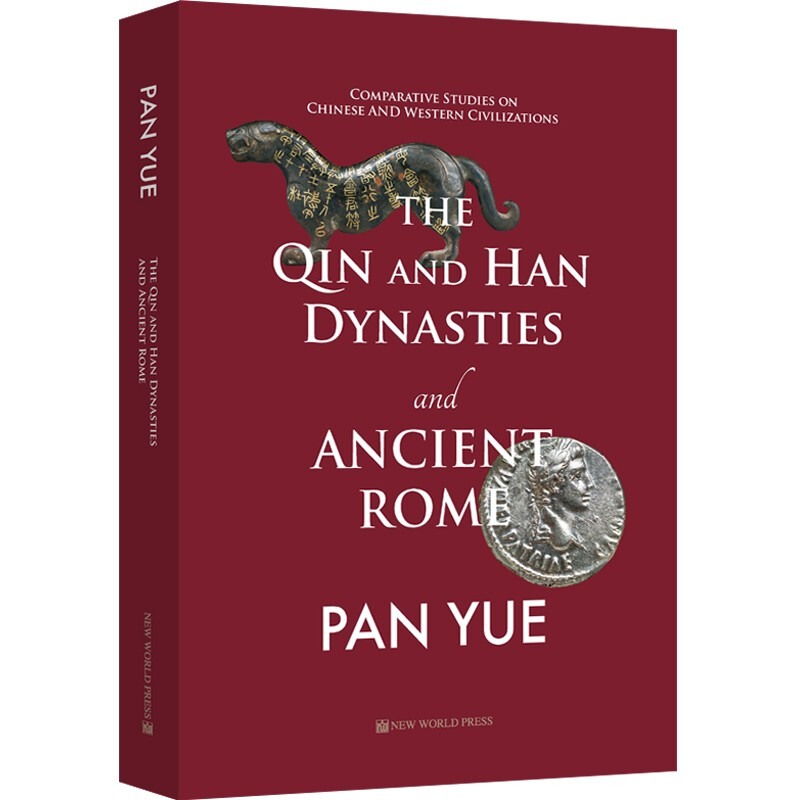- ISBN:9787510473401
- 装帧:80g纯质纸
- 册数:暂无
- 重量:暂无
- 开本:32开
- 页数:360
- 出版时间:2022-06-01
- 条形码:9787510473401 ; 978-7-5104-7340-1
本书特色
“文明因交流而多彩,文明因互鉴而丰富”。中西方文明比较,既能使中国与西方世界深刻地认识对方,准确地认识自己;更能淬炼人类共同价值,推动构建人类命运共同体。 本书为潘岳先生“中西文明比较”系列图书第二卷英文版,聚焦“秦汉与罗马”时期的政治,对两大文明兴衰起伏的原因进行了深刻剖析和比较,深刻论证了中西文明交流互鉴的必要性和重要意义。
内容简介
本书聚焦“秦汉与罗马”时期的政治,作者以极其敏锐的眼光、缜密的分析,从学理上探寻中西文明之源,对中西政治文明进行分析比较。他指出,不同的文明各有高峰低谷,我们不能用别人的高峰来比自己的低谷,也不能用自己的高峰去比别人的低谷;我们应当从高峰中体会到彼此的优点,从低谷中体会到彼此的缺陷,再寻找各自改进之途。本书附录精心选编了多位专家的精彩评论,有助于读者更好地理解、把握本书的深刻内涵。
目录
Contents
Foreword I / i
Foreword II / iii
Preface / vii
Introduction / 1
Chapter I
Two Civilizations / 13
Chapter II
The Western Han Dynasty / 59
Chapter III
The Roman Empire / 137
Conclusion / 205
Appendix: Commentaries / 227
节选
Preface China and the West are already well-acquainted with each other’s science, technology, and economy. They have certain understanding of each other’s political system. However, they are complete strangers with regard to each other’s civilizational core. Moreover, Western political and intellectual elites are even less familiar with the Chinese civilization than their Chinese counterparts are with the Western civilization. For more than a century from the end of the Qing Dynasty (1644-1911) to the present, generations of Chinese have been tirelessly studying Western history and civilization. Today, English is part of compulsory education even in the remotest mountainous areas of China where it may never be used. From top to bottom, Chinese officials are required to be tested on their knowledge of “international conventions” (which means conventions of Western Europe and the United States). There are many great Sinologists in the West, but their wisdom is marginalized in the body politic. A few Western politicians have read The Analects of Confucius and The Art of War by Sunzi, but almost none has systematically read Chinese history. Thus, even in a famous study like The Thucydides Trap, which deals with a potential conflict between the United States and the People’s Republic of China, none of the examples are from Chinese history. All come from Athens and Sparta, the Netherlands, Spain, Germany, Britain, and the United States. The book is entirely about the West’s own history of hegemony (the only non-Western exception being Japan). This habitual resort to the Western historical experience when judging China’s strategy is the root of the West’s repeated mistakes. What are China’s strategic goals? The answer depends on what is the length of Chinese history you are acquainted with. If you think that China has a history of only 30 years of “communist tyranny” plus 40 years of “reform and opening up,” then you may think China’s major goal is to move from “autocracy” to “freedom.” If you know only China’s history that started in 1840 with the “century of humiliation” following the Opium War, then you may think the country must have a “feeling of victimhood” and “will retaliate against the West after its rise.” But what about China’s history before the Opium War? Pre-1840 China remains terra incognita for the vast majority of Western elites. This is not accidental. Hegel, one of the most influential Western philosophers, said about the imperial China: “This empire ever remained autonomous, ever remained what it was.... And so it is an empire untouched by history (ungeschichtlich), for internally it developed undisturbed; it was not destroyed from without. No alien principle came to displace the ancient one. To that extent it has no history.” Hegel was aware that China has “a continuous, well-ordered, and quite well-attested history,” but nonetheless considered the Chinese empire as an “a-historical” entity. The problem was that he did not know Chinese language and could never approach the wealth, complexity, and heterogeneity of China’s history. Nor could other great masters of European thought do it.
作者简介
潘岳,历史学博士。曾任国务院经济体制改革办公室副主任,环境保护部副部长,中华文化学院党组书记、**副院长。现任国务院侨务办公室主任。
-

两张图读懂两宋
¥16.0¥76.0 -

你不知道的古人生活冷知识
¥14.7¥49.0 -

清朝穿越指南
¥14.4¥45.0 -

人类酷刑简史
¥20.1¥59.0 -

万历十五年
¥16.3¥25.0 -

唐潮:唐朝人的家常与流行
¥23.1¥68.0 -

朱元璋传
¥14.0¥39.0 -

从三十项发明阅读世界史
¥11.7¥39.0 -

汉朝其实很有趣
¥9.7¥38.0 -

两晋其实很有趣
¥9.2¥35.0 -

胡同里的姑奶奶
¥27.8¥78.0 -

至道无餘蕴矣:梁漱溟访谈录
¥24.1¥68.0 -

创造圣经的城市
¥19.7¥58.0 -

中国近代史
¥6.0¥20.0 -

硬核原始人
¥21.0¥65.0 -

告别与新生-大师们的非常抉择
¥16.0¥45.8 -

明朝那些事儿大结局 第七部
¥8.9¥29.8 -

中国通史
¥18.5¥45.0 -

消寒图:珍重待春风
¥20.9¥58.0 -

谁是剽窃者:牛顿与莱布尼茨的微积分战争
¥15.8¥45.0













